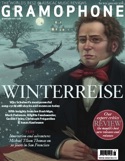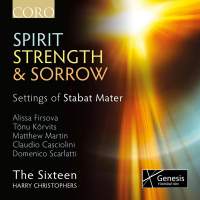Texte paru dans: / Appeared in: |
|
 |
Outil de traduction (Très approximatif) |
|
Reviewer:
Richard
Wigmore Ever innovative in their programming, Harry Christophers and The Sixteen juxtapose Domenico Scarlatti’s beautiful 10-part Stabat mater – stile antico polyphony viewed through the prism of the Italian Baroque – and three new settings of verses from the 13th-century poem commissioned by the Genesis Foundation. All three are touching and effective: imaginative in their choral sonorities and colouring of the text, skilfully balancing a strong feeling for tradition with a distinctive individual voice.
Tõnu Kõrvits draws on folk music from a south-eastern region of his native Estonia in a flavoursome mix of modality and tortuous chromaticism. Emphasising compassion and the blissful certainty of paradise over sin and suffering, Russianborn Alissa Firsova distils a quiet, luminous ecstasy in slow-moving textures that evoke both the music of the Orthodox liturgy and (in its oscillations between major and minor) the Western tonal tradition. With a nod to Benjamin Britten, Matthew Martin interleaves parts of the Latin text with specially written verses by poet-priest Robert Willis to create a ‘Passiontide Triptych’. The upshot is the most varied and dramatic of the three Stabat materinspired works, an individual contribution to the Anglican choral tradition that also weaves in the Salve regina plainchant and an old German chorale.
In all the
works here The Sixteen sing with their now-familiar eloquence and polish. Caught
in the glowing acoustic of St Augustine’s, Kilburn, their sound is beautifully
integrated over a wide dynamic range (from rarefied pianissimos to tuttis of
sumptuous fullness), their intonation well-nigh perfect. At moments in their
intimate and elegiac performance of the Scarlatti I wanted a dose of Latin
theatricality. But in the new works their singing, technically and expressively,
is beyond criticism, whether in the rapt, incantatory lines of the Firsova, the
violent picture of the fires of hell in the Martin or the mysteriously serene
prayer that closes the Kõrvits.
|
|
|
|
|
|
Cliquez l'un ou l'autre
bouton pour découvrir bien d'autres critiques de CD |
|




